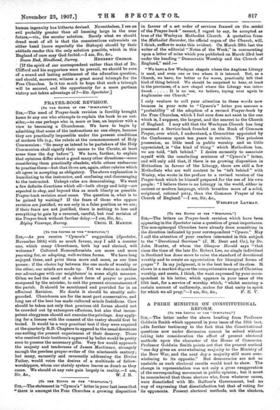[TO TIM EDITOR Or Till "EPliCTATOR."]
Sin,—The statement in "Cymro's " letter in your last issue that "there is amongst the Free Churches a growing disposition in favour of a set order of services framed on the ,mOdel of the Prayer-book " cannot, I regret to say, be accepted as true of the Wesleyan Methodist Church. A quotation from the Afethodist Recorder, the official organ of the Church, will, I think, suffice to make this evident. On March 28th last the writer of the editorial " Notes of the Week," in commenting upon a letter of mine which you published on March 23rd last under the heading " Democratic Worship and the Church of England," said :— " We have a few Wesleyan chapels where the Anglican Liturgy is used, and even one or two where it is intoned. But, as a Church, we have, for better or for worse, practically left that kind of thing behind. We should be surprised to hear, at least in the provinces, of a new chapel where the Liturgy was intro- duced It is no use, we believe, trying ever again to Anglicanise our Church."
I only venture to call your attention to these words now because in your note to " Cymro's " letter you assume a " probability " of the adoption of a revised Prayer-book by the Free Churches, which I feel sure does not exist in the one which is, I suppose, the largest, and the nearest to the Church of England. I may add that the Wesleyan Church has long possessed a Service-book founded on the Book of Common Prayer, over which, I understand, a Committee appointed by the Conference spent ten years in revision. This priceless possession, so little used in public worship and so- little appreciated, is "the kind of thing" which Methodism has, we are told, "left behind." I desire earnestly to associate myself with the concluding sentence of " Cymro's " letter, and will only add that, if there is no growing disposition in Methodism in favour of the Liturgy, there are still a few Methodists who are well content to be "left behind" with Wesley, who wrote in the preface to a revised version of the Prayer-book which he himself prepared for the use of his own people: "I believe there is no Liturgy in the world, either in ancient or modern language, which breathes more of a solid, scriptural, rational piety, than the Common Prayer of the Church of England."—I am, Sir, &c.,
WESLEYAN LAYMAN.


















































 Previous page
Previous page